Morphemes 词素分类
语言学中的Morpheme

语⾔学中的Morphemefree morpheme and bound morpheme ⾃由语素和粘着语素Morphemes can be classified into two types in terms of their capacity of occuring alone.根据能否单独出现,可以将语素分为两类。
free morpheme(⾃由语素):-------Those morphemes which may occur alone, that is , those which may constitue words by themselves, are free morphemes(能单独出现,也就是能独⾃成词的,叫做⾃由语素.)Free morphemes: morphemes which may constitute words by themselvesbound morpheme(粘着语素): -s in dogs, -al in national, and dis- n disclose, cannot occur alone. They must appear with at least another morpheme, and are called bound morphemes.(dogs中的-s, national 中的-al, disclose中的dis-不能单独出现,它们必须跟⾄少⼀个其他语素共现,这样的语素叫做粘着语素.)Bound morphemes: morphemes which can not be used by themselves, but must be combined with other morphemes to form wordsroot, affix and stem 词根,词缀和词⼲(1)root(词根): the base from of a word that cannot further be analyzed without total loss of identity. That is to say, it is that part of the word left when all the affixes are removed. (词根是词的基本形式,不能再作进⼀步的分析⽽完全不损失同⼀性。
英语词汇学总结
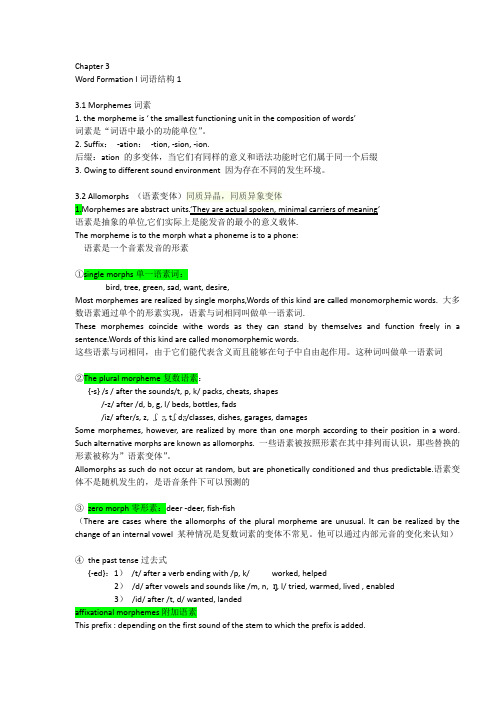
Chapter 3Word Formation I词语结构13.1 Morphemes词素1. the morpheme is ‘ the smallest functioning unit in the composition of words’词素是“词语中最小的功能单位”。
2.Suffix:-ation:-tion, -sion, -ion.后缀:ation 的多变体,当它们有同样的意义和语法功能时它们属于同一个后缀3.Owing to different sound environment 因为存在不同的发生环境。
3.2 Allomorphs (语素变体)同质异晶,同质异象变体1.Morphemes are abstract units.‘They are actual spoken, minimal carriers of meaning’语素是抽象的单位,它们实际上是能发音的最小的意义载体.The morpheme is to the morph what a phoneme is to a phone:语素是一个音素发音的形素①single morphs单一语素词:bird, tree, green, sad, want, desire,Most morphemes are realized by single morphs,Words of this kind are called monomorphemic words.大多数语素通过单个的形素实现,语素与词相同叫做单一语素词.These morphemes coincide withe words as they can stand by themselves and function freely in a sentence.Words of this kind are called monomorphemic words.这些语素与词相同,由于它们能代表含义而且能够在句子中自由起作用。
词素分类
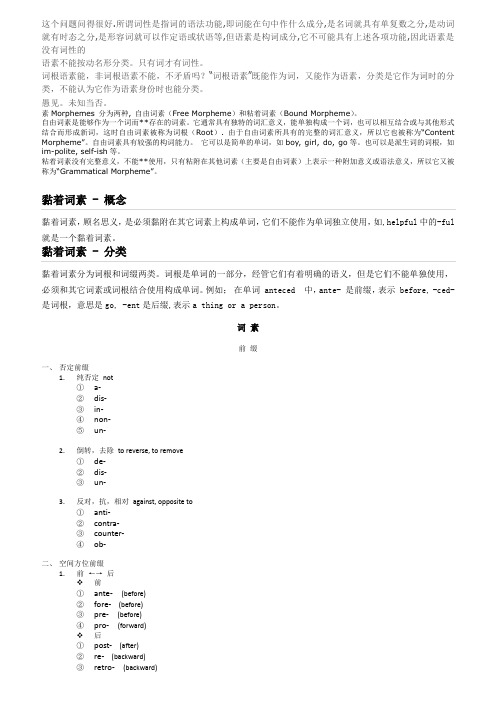
5.六
1sex-(six)
2hexa-(six)
6.七
1hepta-(seven)
7.八
1octa-(eight)
8.九
1nona-(nine)
9.十
1deca-(ten)
heci-
10.百
1hecto-(hundred)
2centi-(hundred)
11.千
1kilo-(thousand)
黏着词素-分类
黏着词素分为词根和词缀两类。词根是单词的一部分,经管它们有着明确的语义,但是它们不能单独使用,必须和其它词素或词根结合使用构成单词。例如;在单词anteced中,ante-是前缀,表示before, -ced-是词根,意思是go, -ent是后缀,表示a thing or a person。
词素
前缀
一、否定前缀
1.纯否定not
1a-
2dis-
3in-
4non-
5un-
2.倒转,去除to reverse, to remove
1de-
2dis-
3un-
3.反对,抗,相对against, opposite to
1anti-
2contra-
3counter-
4ob-
二、空间方位前缀
1.前←→后
2mini-(small)
2.多←→少
多
1multi-(many)
2poly-(many)
少
1under-(less than, not enough)
3.好←→坏
好
1bene-(good, well)
2eu-(good, well)
morpheme

Morphemes⏹Morpheme (词素): morph (=form) + -eme⏹the smallest meaningful unit of a language, not divisible or analyzable into smaller forms⏹What is considered a single word in English may be composed of one or moremorphemes⏹Stockwell (2001: 58-61): Properties of morphemes⏹(1) A morpheme is the smallest unit associated with a meaning.Compare care in the two groups of words:☐care, caress, scare☐care, careless, careful, caring, uncaring, caregiver⏹(2) Morphemes are recyclable units.☐One of the most important properties of the morpheme is that it can be used again and again to form many words.⏹care, careless, careful, caring, uncaring, caregiver⏹(3) Morphemes must not be confused with syllables.☐ A morpheme may be represented by any number of syllables, though typically only one or two, sometimes three or four.Disagreeable: five syllables & three morphemes☐Syllables have nothing to do with meaning.⏹(4) One and the same morpheme may take phonetically different shapes.☐-(e)s: three phonological forms:⏹books, pigs, horses /s/ /z/ /iz/⏹The three forms are variants of the same morpheme -s. They arecalled allomorphs.☐An allomorph(词素变体)is any of the variant forms of a morpheme as conditioned by position or adjoining sounds.⏹(5) Two different morphemes may have the same shape☐-s⏹Marking plural meaning: cats, dogs, workers, students⏹Marking present tense: works, sings, runs, jumps…Classification of Morphemes☐Two main types of classification☐A: free v.s. bound⏹Free morphemes(自由词素): morphemes which occur independentlyas words⏹Bound morphemes(粘着词素): morphemes which occur only as partof a word which could not stand on its own☐B: roots v.s. affixes (non-root)⏹Roots or root morphemes(词根)☐ A root is the basic unchangeable part of a word and it conveysthe main lexical meaning of the word☐Every word has at least one root. Roots are at the centre ofword-derivational processes.Roots : free roots & bound roots☐Free roots (自由词根)⏹Free roots: In English, many roots are free morphemes: man, sun, run,milk, black⏹ A word consisting of one free root is a simple word⏹Free roots provide the English language with a basis for the formationof new words☐Bound roots (粘着词根)⏹Most bound roots found in English today are of classical origin, i.e.they were borrowed into English from Latin and Greek during theRenaissance, or through French.☐tain from Latin: to hold –contain, detain, retain☐To be completed, bound roots require that another morphemebe attached to them.Affixes: inflectional & derivational☐Affixes (词缀)⏹Affix is a collective term for the type of formative that can be usedonly when added to another morpheme. So affixes are boundmorphemes.⏹Affixes have two quite different functions and can be divided into twomore types:☐a: derivational (派生) affixes: affixes that have the function ofderiving new words☐b: inflectional (屈折) affixes: affixes that do not participate inword formation at alla. Inflectional affixes (inflectional morphemes)⏹to express meanings as plurality, tense, and the comparative or superlative degree☐Plural marker☐The present particle☐The past tense and past participle☐The comparative/superlative☐not to form a new word with new lexical meaning⏹not to change the word-class of the wordb. Derivational affixes (derivational morphemes)☐They are added to another morpheme and derive a new word.⏹rewrite, minicar, supermarket, worker, modernize, meanness☐Many have a specific lexical meaning⏹-ism: doctrine or point of view⏹pro-: on the side of☐Some have more than one meaningAffixesAffixes are subdivided into prefixes and suffixesThey can be grouped according to Linguistic origin and ProductivityMorphologyMorphology: the study of the internal structure of words, and of the rules by which words are formed.Fields of morphology: the study of inflections (inflectional morphology) and the study of word formation (lexical or derivational morphology).。
morpheme概念解释

morpheme概念解释摘要:I.引言- 介绍morpheme 的定义和作用II.morpheme 的类型- 自由型词素(free morpheme)- 束缚型词素(bound morpheme)III.morpheme 的语法功能- 词根(stem)- 前缀(prefix)- 后缀(suffix)- 词缀(affix)IV.morpheme 在语言学中的重要性- 构成词汇的基本单位- 体现语言的形态变化V.汉语中的morpheme- 语素(morpheme) 与偏旁(radical) 的比较- 汉语morpheme 的特点和功能VI.总结- 总结morpheme 的概念和作用- 强调morpheme 在语言学研究中的重要性正文:I.引言morpheme 是语言学中的一个重要概念,它指的是语言中最小的具有独立语义或功能的语言单位。
morpheme 是词汇构成的基础,通过组合和变化可以形成各种不同的词汇和语法结构。
本文将详细介绍morpheme 的概念、类型、语法功能以及其在语言学中的重要性。
II.morpheme 的类型根据morpheme 的功能和位置,可以将其分为自由型词素(free morpheme) 和束缚型词素(bound morpheme)。
自由型词素(free morpheme) 是指可以独立出现在语言中,具有完整语义和功能的morpheme。
例如:open(打开)、tour(旅游)。
束缚型词素(bound morpheme) 则需要依附于其他语言单位,不能独立出现。
例如:在英语中的-ing(进行)、-ed(过去式)。
III.morpheme 的语法功能morpheme 在语言中具有多种语法功能,主要包括词根(stem)、前缀(prefix)、后缀(suffix) 和词缀(affix)。
词根(stem) 是词汇的基本结构,通常表示一个词的核心意义。
例如:book(书)、run(跑)。
Morpheme(词素或语素)

Allomorph——语素变体 Allomorph——语素变体
Some morphemes have a single form in all contexts, such as “dog, bark, cat”,etc. In other instances, there may be some variation, that is, a morpheme may have alternate shapes or phonetic forms. They are said to be the allomorphs of the morpheme, the plural morpheme may be represented by: map----maps [s] dog----dogs [z] watch----watches [iz] mouse----mice [ai] ox----oxen [n] tooth----teeth sheep----sheep Each of the underlined part is called an allomorph of plural morpheme.
ห้องสมุดไป่ตู้
Free morpheme & bound morpheme
Free morpheme----is one that may constitute a word (free form) by itself, such as bed, tree, sing, dance, etc. Bound morpheme----is one that may appear with at least one other morpheme. They can not stand by themselves, such as “-s” in “dogs”, “al” in “national”, “dis-” in “disclose”, “ed” in “recorded”, etc.
语言学morpheme课件
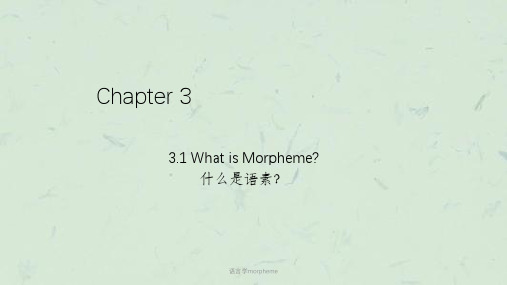
形态学的变化和词素变体
语言学morpheme
1 、 Free morpheme and Bound morpheme 自由语素和黏着语素
A. Freemorphemes: Those that may occur alone, those
B.
(词根是构成词的基础成分,不能再作进一步分析而不破坏其意
义。也就是说,把一个词的所有词缀去掉之后的部分就是词根。)
C. eg: friend as in unfriendliness.
All words contain a root morpheme.
所有的词都至少包含一个词根词素。
Roots may be • Free(自由语素): those that can stand by themselves, eg:
• It studies the internal structure of words, and the rules by which words are formed.它研究词的 内部结构和构造规则。
语言学morpheme
• E.G. • purify pur(e) , -ify • amplify(放大) simplify(简单化)
which may make up words by themselves.(可以单ation, close
mono-morphemic words(单语素词). All mono-morphemic words are free morphemes.
black in blackboard, blackbird;
• Bound(黏着语素): those that cannot stand by themselves
词素分类

这个问题问得很好.所谓词性是指词的语法功能,即词能在句中作什么成分,是名词就具有单复数之分,是动词就有时态之分,是形容词就可以作定语或状语等,但语素是构词成分,它不可能具有上述各项功能,因此语素是没有词性的语素不能按动名形分类。
只有词才有词性。
词根语素能,非词根语素不能,不矛盾吗?“词根语素”既能作为词,又能作为语素,分类是它作为词时的分类,不能认为它作为语素身份时也能分类。
愚见。
未知当否。
素Morphemes 分为两种, 自由词素(Free Morpheme )和粘着词素(Bound Morpheme )。
自由词素是能够作为一个词而**存在的词素。
它通常具有独特的词汇意义,能单独构成一个词,也可以相互结合或与其他形式结合而形成新词,这时自由词素被称为词根(Root ). 由于自由词素所具有的完整的词汇意义,所以它也被称为“Content Morpheme”。
自由词素具有较强的构词能力。
它可以是简单的单词,如boy, girl, do, go 等。
也可以是派生词的词根,如 im-polite, self-ish 等。
粘着词素没有完整意义,不能**使用,只有粘附在其他词素(主要是自由词素)上表示一种附加意义或语法意义,所以它又被称为“Grammatical Morpheme”。
黏着词素,顾名思义,是必须黏附在其它词素上构成单词,它们不能作为单词独立使用,如,helpful 中的-ful就是一个黏着词素。
黏着词素分为词根和词缀两类。
词根是单词的一部分,经管它们有着明确的语义,但是它们不能单独使用,必须和其它词素或词根结合使用构成单词。
例如; 在单词 anteced ENT 中,ante- 是前缀,表示 before,-ced-是词根,意思是go, -ent 是后缀,表示a thing or a person 。
词 素前 缀一、 否定前缀1.纯否定 not ① a- ② dis- ③ in- ④ non- ⑤ un-2.倒转,去除 to reverse, to remove ① de- ② dis- ③ un- 3.反对,抗,相对 against, opposite to ① anti- ② contra- ③ counter- ④ ob-二、 空间方位前缀1.前 ←→ 后 ❖前① ante- (before) ② fore- (before) ③ pre- (before) ④ pro- (forward) ❖后① post- (after) ② re- (backward) ③ retro- (backward)2.上 ←→ 下 ❖上 ① over- (above, on; excessive, toomuch)② super- (above, beyond) ③ sur- (over, above)④hyper-(excessive, too much)⑤epi- (above)❖下①sub-(undre)②de-(down)③under- (below; less than)④hypo-(under, beneath)⑤infra- (below)3.内←→外❖内①in-(in, enter)②im-(in, inward, enter)③intro- (in, inward)④intra-(inside)⑤en- (in)em- (b, m, p前)❖外①e-(out)②ex-(out)③extra- (outside of, beyond)④ultra-(beyond)⑤out- (surpassing, out)4.中间←→周围❖中间①inter-(between)②mid-(in the middle of)❖周围①circum-(round, around)三、对比前缀1.大←→小❖大①macro- (large)②mega-(large)③magn- (big, great)❖小①micro- (very small)②mini- (small)2.多←→少❖多①multi- (many)②poly-(many)❖少①under- (less than, not enough)3.好←→坏❖好①bene- (good, well)②eu-(good, well)❖坏①mal- (bad)male-②mis- (bad)4.新←→旧❖新①neo- (new)❖旧①old- (very small)②pale- (very old, of ancient time)paleo-5.朝向←→离开❖朝向①ad- (to, toward)❖离开①ab- (away, off)②di- (away)6.相同←→不同❖相同①homo- (same)❖不同①hetero- (different)7.聚合←→分散❖聚合①co- (together)②syn-(together, same)sym-❖分散①dis- (apart)②se- (apart)8.正确←→错误❖正确①ortho- (right, straight)❖错误①mis- (wrong)9.喜爱←→憎恶❖喜爱①phil- (liking, fond of)❖憎恶①mis- (hate)10.全←→半❖全①holo- (complete)②omni-(all or everywhere)③pan- (all)❖半①half-②semi- (half, partially)③hemi- (half)④demi- (half)四、数字前缀1.一①mono- (one, single)②uni-(one, single)二①bi- (two, twice)②twi-(two)③di- (two, double)du-④ambi-(both)⑤amphi- (both)2.三①tri- (three)3.四①quadri- (four)②quarter-(one fourth)4.五①penta- (five)②quinque-(five)5.六①sex- (six)②hexa-(six)6.七①hepta- (seven)7.八①octa- (eight)8.九①nona- (nine)9.十①deca- (ten)heci-10.百①hecto- (hundred)②centi-(hundred)11.千①kilo- (thousand)②milli-(thousand)12.万①myria-13.百万,兆,大量①mega- (six)五、其他前缀1.横过(到对面),穿过①dia- (through, across)②trans-(through, across)③per- (through, across)2.自己,自动①auto-(self)3.心灵,精神,心理①psycho- (mind)4.假的,伪的①pseudo- (false)5.继(无血缘关系)①step- (not by blood)6.改变①trans- (change)7.远①tele- (far, distant)六、改变词性前缀1.a-①将动词变成谓语性形容词alike②将名词变成副词ahead③将名词变成动词amass2.be-①在名词或形容词前,构成及物动词befriend②构成一些介词before3.en- (b, p, m 前为em-)①构成动词enable七、多义前缀1.a-①改变词性②否定not③状态④place where2.ad-①to toward②again, to add3.be-①改变词性②构成介词4.de-①to remove, to reverse②down5.di- (du-)①two, double②away6.dis-①not②to reverse, to remove③apart7.en- (em- b, p, m前)①in②构成动词8.ad-①out②former9.in- (im- b, p, m前)①not②inside, to enter10.mis-①bad②wrong③to hate11.over-①above, on②excessive, too much12.re-①to undo, to reverse②backward③again13.trans-①across②through③to change14.un-①not②to reverse15.under-①beneath, below②less, not enough后缀一、名词后缀1.表示“人”1)inhabitants or dwellers①-an②-er③-ese2)belonging to a certain occupation①-ian (c, y结尾的形容词或名词后)②-er3) a supporter or believer of a doctrine①-an②-arian③-ist4)one who does or performs an act①-ar②-ary③-ate④-ator⑤-ist⑥-ee⑦-eer⑧-or5)to denote a specific feeling①-ster(a bad sense 贬义)②-y(dearness 亲昵)6)To form a feminine noun①-ess 2.抽象1)state or quality①-ance, -ancy附在-ant结尾的形容词后附在动词词根后②-ence, -ency附在-ent结尾的形容词后③-cy附在-te, -tic结尾的词干后④-ability附在-able结尾的形容词后⑤-ibility附在-ible结尾的形容词后⑥-ness附在形容词后2)the action & the result of the action①-al (the act of)②-ion, -sion, -tion③-ment (the result of an action)④-ure (action or result)3)indicate abstract concepts①-ship (state or condition of)②-th③-tude4)power, rule, government①-cracy5)action, state or condition, doctrines,example of a use①-ism6)state, condition①-hood②-age7)relationship, status, identity①-ship3.学科①-ic, -ics②-logy4.物质(物品和工具)①-al②-er③-ery5.细小①-cle②-en③-ette④-ling⑤-let二、形容词后缀1.可……的,能……的,易于……的1)-able2)-ible3)-ile2.如……的,似……的,……形状的1)-esque2)-ish3)-like4)-y5)-ly3.有……的,多……的1)-ed2)-ful3)-ous4)-y4.属于……的,与……有关的1)-al2)-an3)-ar4)-ial5)-ic6)-tic7)-ual5.具有……性质的1)-acious2)-aneous3)-ant4)-ar5)-ary6)-ate7)-ative8)-atory9)-ed10)-fic11)-ful12)-ical13)-id14)-ious15)-ite16)-itive17)-ive18)-ly19)-ory20)-ous21)-some6.某国的,某地的1)-an2)-ese3)-ian4)-ish7.其它1)-ing①使……的excit ing②正……在的develop ing2)-ed①已……的retir ed②受……的educat ed3)-ish 略……的,稍……的green ish cold ish4)-less 无……的use less5)-proof 防……的,不透……的water proof air proof三、动词后缀1.to make; to cause to become①-ate②-en③-fy④-ish⑤-ize⑥-ise (BrE)2.repeated or continuous action①-er3.onomatopoeic action①-sh四、副词后缀1.方式,方法,状态,……地①-ably②–ibly③–ly (一般加在形容词后)2.表示方向①-ward②-wise五、多义后缀1.-al①与……有关,有……的特点autumn al②……的行为refus al③物品manu al2.-an①……国(人)Europe an②支持(信仰)……的Christi an③职业librari an3.-ar①加在名词后,构成形容词singul ar②加在动词后,构成名词li ar4.-ate①表现出……的,充满……的consider ate②使……,使成为……regul ate③机构或部门consul ate5.-er①加在动词后,构成名词fertiliz er②职业,工作bank er③……地方或国家的人northern er④构成形容词或副词比较级small er hard er6.-ish①像……一样的,有……特点的snobb ish②……国的,……语的Brit ish Engl ish③沉迷于……的,倾向于……的book ish④稍许,有点儿sweet ish⑤动词后缀nour ish7.-ism①加在动词后,构成名词critic ism②动作,事业tour ism③状态,状况alcohol ism④学说,主义,信条social ism⑤语言上的用法和特点wittic ism8.-ly①加在形容词后,构成副词gradual ly②加在表示时间的名词前,构成形容词或副词;每……的week ly③像……一样的,具有……性质的world ly9.-ment①行为move ment②行为的结果、状态refresh ment③行为后的具体产物pave ment10.-ship①状态,身份member ship②技巧,能力leader ship③关系kin ship11.-y①有……的,表现出……的,像……一样的silver y②亲昵mumm y③加在动词后,构成名词。
词素分类
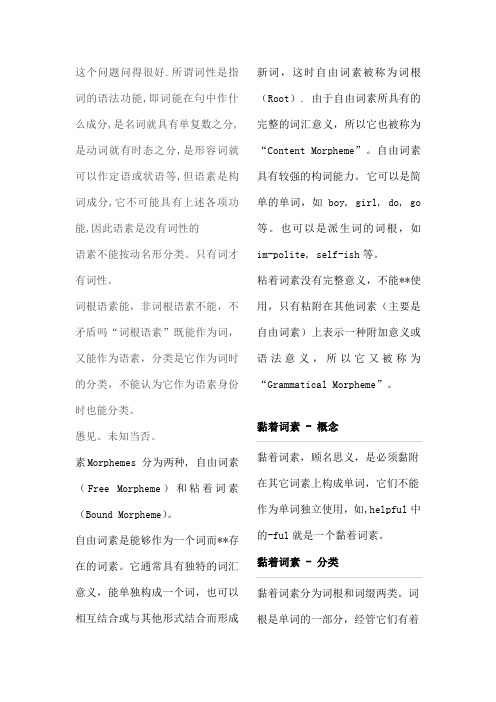
这个问题问得很好.所谓词性是指词的语法功能,即词能在句中作什么成分,是名词就具有单复数之分,是动词就有时态之分,是形容词就可以作定语或状语等,但语素是构词成分,它不可能具有上述各项功能,因此语素是没有词性的语素不能按动名形分类。
只有词才有词性。
词根语素能,非词根语素不能,不矛盾吗“词根语素”既能作为词,又能作为语素,分类是它作为词时的分类,不能认为它作为语素身份时也能分类。
愚见。
未知当否。
素Morphemes 分为两种, 自由词素(Free Morpheme)和粘着词素(Bound Morpheme)。
自由词素是能够作为一个词而**存在的词素。
它通常具有独特的词汇意义,能单独构成一个词,也可以相互结合或与其他形式结合而形成新词,这时自由词素被称为词根(Root). 由于自由词素所具有的完整的词汇意义,所以它也被称为“Content Morpheme”。
自由词素具有较强的构词能力。
它可以是简单的单词,如boy, girl, do, go 等。
也可以是派生词的词根,如im-polite, self-ish等。
粘着词素没有完整意义,不能**使用,只有粘附在其他词素(主要是自由词素)上表示一种附加意义或语法意义,所以它又被称为“Grammatical Morpheme”。
黏着词素,顾名思义,是必须黏附在其它词素上构成单词,它们不能作为单词独立使用,如,helpful中的-ful就是一个黏着词素。
黏着词素分为词根和词缀两类。
词根是单词的一部分,经管它们有着明确的语义,但是它们不能单独使用,必须和其它词素或词根结合使用构成单词。
例如;在单词anteced?中,ante- 是前缀,表示before, -ced-是词根,意思是go, -ent是后缀,表示a thing or a person。
词素前缀一、否定前缀1.纯否定 not①a-②dis-③in-④non-⑤un-2.倒转,去除 to reverse, toremove①de-②dis-③un-3.反对,抗,相对 against,opposite to①anti-②contra-③counter-④ob-二、空间方位前缀1.前←→后前①ante- (before)②fore- (before)③pre- (before)④pro- (forward)后①post- (after)②re- (backward)③retro- (backward)2.上←→下上①over- (above, on;excessive, too much)②super- (above,beyond)③sur- (over, above)④hyper- (excessive,too much)⑤epi- (above)下①sub- (undre)②de- (down)③under- (below; lessthan)④hypo- (under,beneath)⑤infra- (below)3.内←→外内①in- (in, enter)②im- (in, inward,enter)③intro- (in, inward)④intra- (inside)⑤en- (in)em- (b, m, p前)外①e- (out)②ex- (out)③extra- (outside of,beyond)④ultra- (beyond)⑤out- (surpassing,out)4.中间←→周围中间①inter- (between)②mid- (in the middleof)周围①circum- (round,around)三、对比前缀1.大←→小大①macro- (large)②mega- (large)③magn- (big, great)小①micro- (very small)②mini- (small)2.多←→少多①multi- (many)②poly- (many)少①under- (less than,not enough)3.好←→坏好①bene- (good, well)②eu- (good, well)坏①mal- (bad)male-②mis- (bad)4.新←→旧新①neo- (new)旧①old- (very small)②pale- (very old, ofancient time)paleo-5.朝向←→离开朝向①ad- (to, toward)离开①ab- (away, off)②di- (away)6.相同←→不同相同①homo- (same)不同①hetero- (different)7.聚合←→分散聚合①co- (together)②syn- (together,same)sym-分散①dis- (apart)②se- (apart)8.正确←→错误正确①ortho- (right,straight)错误①mis- (wrong)9.喜爱←→憎恶喜爱①phil- (liking, fondof)憎恶①mis- (hate)10.全←→半全①holo- (complete)②omni- (all oreverywhere)③pan- (all)半①half-②semi- (half,partially)③hemi- (half)④demi- (half)四、数字前缀1.一①mono- (one, single)②uni- (one, single)二①bi- (two, twice)②twi- (two)③di- (two, double)du-④ambi- (both)⑤amphi- (both)2.三①tri- (three)3.四①quadri- (four)②quarter- (onefourth)4.五①penta- (five)②quinque- (five)5.六①sex- (six)②hexa- (six)6.七①hepta- (seven)7.八①octa- (eight)8.九①nona- (nine)9.十①deca- (ten)heci-10.百①hecto- (hundred)②centi- (hundred)11.千①kilo- (thousand)②milli- (thousand)12.万①myria-13.百万,兆,大量①mega- (six)五、其他前缀1.横过(到对面),穿过①dia- (through,across)②trans- (through,across)③per- (through,across)2.自己,自动①auto- (self)3.心灵,精神,心理①psycho- (mind)4.假的,伪的①pseudo- (false)5.继(无血缘关系)①step- (not by blood)6.改变①trans- (change)7.远①tele- (far, distant)六、改变词性前缀1.a-①将动词变成谓语性形容词alike②将名词变成副词ahead③将名词变成动词amass2.be-①在名词或形容词前,构成及物动词befriend②构成一些介词before3.en- (b, p, m 前为em-)①构成动词enable七、多义前缀1.a-①改变词性②否定 not③状态④place where2.ad-①to toward②again, to add3.be-①改变词性②构成介词4.de-①to remove, to reverse②down5.di- (du-)①two, double②away6.dis-①not②to reverse, to remove③apart7.en- (em- b, p, m前)①in②构成动词8.ad-①out②former 9.in- (im- b, p, m前)①not②inside, to enter10.mis-①bad②wrong③to hate11.over-①above, on②excessive, too much12.re-①to undo, to reverse②backward③again13.trans-①across②through③to change14.un-①not②to reverse15.under-①beneath, below②less, not enough后缀一、名词后缀1.表示“人”1)inhabitants or dwellers①-an②-er③-ese2)belonging to a certainoccupation①-ian (c, y结尾的形容词或名词后)②-er3) a supporter or believerof a doctrine①-an②-arian③-ist4)one who does or performsan act①-ar②-ary③-ate④-ator⑤-ist⑥-ee⑦-eer⑧-or5)to denote a specificfeeling①-ster (a bad sense 贬义)②-y (dearness 亲昵)6)To form a feminine noun①-ess2.抽象1)state or quality①-ance, -ancy附在-ant结尾的形容词后附在动词词根后②-ence, -ency附在-ent结尾的形容词后③-cy附在-te, -tic结尾的词干后④-ability附在-able结尾的形容词后⑤-ibility附在-ible结尾的形容词后⑥-ness附在形容词后2)the action & the result ofthe action①-al (the act of)②-ion, -sion, -tion③-ment (the result ofan action)④-ure (action orresult)3)indicate abstractconcepts①-ship (state orcondition of)②-th③-tude4)power, rule, government①-cracy5)action, state orcondition, doctrines,example of a use①-ism6)state, condition①-hood②-age7)relationship, status,identity①-ship3.学科①-ic, -ics②-logy4.物质(物品和工具)①-al②-er③-ery5.细小①-cle②-en③-ette④-ling⑤-let二、形容词后缀1.可……的,能……的,易于……的1)-able2)-ible3)-ile2.如……的,似……的,……形状的1)-esque2)-ish3)-like4)-y5)-ly3.有……的,多……的1)-ed2)-ful3)-ous4)-y4.属于……的,与……有关的1)-al2)-an3)-ar4)-ial5)-ic6)-tic7)-ual5.具有……性质的1)-acious2)-aneous3)-ant4)-ar5)-ary6)-ate7)-ative8)-atory9)-ed10)-fic11)-ful12)-ical13)-id14)-ious15)-ite16)-itive17)-ive18)-ly19)-ory20)-ous21)-some6.某国的,某地的1)-an2)-ese3)-ian4)-ish7.其它1)-ing①使……的excit ing②正……在的develop ing2)-ed①已……的retir ed②受……的educat ed3)-ish 略……的,稍……的green ish cold ish4)-less 无……的use less5)-proof 防……的,不透……的water proofair proof三、动词后缀1.to make; to cause tobecome①-ate②-en③-fy④-ish⑤-ize⑥-ise (BrE)2.repeated or continuousaction①-er3.onomatopoeic action①-sh四、副词后缀1.方式,方法,状态,……地①-ably②–ibly③–ly (一般加在形容词后)2.表示方向①-ward②-wise五、多义后缀1.-al①与……有关,有……的特点autumn al②……的行为refus al③物品manu al2.-an①……国(人)Europe an②支持(信仰)……的Christi an③职业librari an3.-ar①加在名词后,构成形容词singul ar②加在动词后,构成名词li ar4.-ate①表现出……的,充满……的consider ate②使……,使成为……regul ate③机构或部门consul ate5.-er①加在动词后,构成名词fertiliz er②职业,工作bank er③……地方或国家的人northern er④构成形容词或副词比较级small er hard er6.-ish①像……一样的,有……特点的snobb ish②……国的,……语的Brit ish Engl ish③沉迷于……的,倾向于……的book ish④稍许,有点儿sweet ish⑤动词后缀nour ish7.-ism①加在动词后,构成名词critic ism②动作,事业tour ism③状态,状况alcohol ism④学说,主义,信条social ism⑤语言上的用法和特点wittic ism8.-ly①加在形容词后,构成副词gradual ly②加在表示时间的名词前,构成形容词或副词;每……的week ly③像……一样的,具有……性质的world ly9.-ment①行为move ment②行为的结果、状态refresh ment③行为后的具体产物pave ment10.-ship①状态,身份member ship②技巧,能力leader ship③关系kin ship11.-y①有……的,表现出……的,像……一样的silver y②亲昵mumm y③加在动词后,构成名词。
英语专八人文知识 语言学必背第4讲-形态学

英语专八人文知识语言学必背第4讲:形态学第四节形态学Morphology一、基本概念研究单词内部结构及其构成的规则It studies the internal structure of words and the rules by which words are formed.二、相关概念1.语素Morpheme:研究的basic unit,不能再进一步分成更小的单位而不破坏或者彻底改变词汇/语法意义的单位,desire是 a morpheme,desir+able就是two morphemes自由语素free morpheme:可以独立出现、独立成词的语素。
如girl,rely等黏着语素bound morpheme:必须与其它语素一起出现的语素,词缀居多。
如pre-,-al,-ment,dis-等2.语速变体Allomorph:相对抽象,是语素的实际体现,不改变词义,但会在形式上有所变化similar to allophone3.词的曲折变化Inflection:其实就是在原词上加上词缀的过程-ed,-ing,-s etc.不会改变词义,也不会引起词的语法类别的改变4.几个易混的概念词素Lexemes:就是同底数幂的概念,是一组词的共有因子,如writer、writing、wrote等拥有的write就是词素,必须有一群词词根Root:单词的基础,无法再分割成更小的单位。
两类:若词根是自由语素,则为自由词根,否则是黏着词根词干Stem:是可以附加词缀的语素或者语素群:friend in friends;friendship in friendships,词干词根,如education是词干,词根是educate5.词语Word:词的三种含义a physically definable unit, a common facter underlying a set of forms, a grammatical unit,介于词组和语素之间实词Lexical words:传递实际语义内容的词,包括nouns, verbs, adj., 大部分adv.虚词Functional words:承担语法意义、执行句法或结构功能的词,包括prep. Articles冠词,pronoun. Conj.连词等开放词open classes:可无限容纳新成员的词,如名形、部分动词/副词等;封闭词类closed classes无法或很难容纳新成员的词,如介代连指情态等6.三种语言:黏着语言Agglutinating or Agglutinative Language:在英语中一般用介词、所有格来表达的概念,在黏着语言中一般作为语素出现在一个单词中曲折语言Inflecting Language:指那些大量使用曲折形式的语言孤立语言Isolated Language/分析语言Analytical Language:一般使用独立的词语来表示单独的概念和功能。
英语词素分类速记
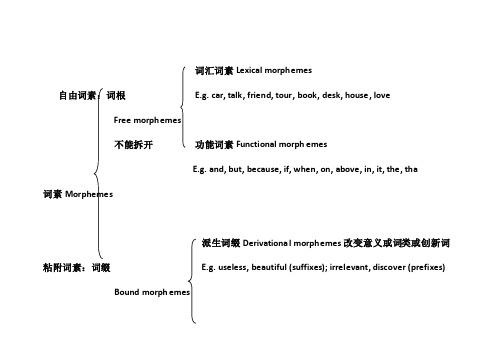
词汇词素Lexical morphe mes自由词素:词根 E.g. car, talk, friend, tour, book, desk, house, loveFree morphe mes不能拆开功能词素Functio nal morphe mesE.g. and, but, becaus e, if, when, on, above, in, it, the, tha词素Morphemes派生词缀Derivat ional morphe mes改变意义或词类或创新词粘附词素:词缀 E.g. useles s, beauti ful (suffix es); irrele vant, discov er (prefix es) Boundmorphe mes可以拆开屈折词缀Inflect ional morphe mes不改变意义,语法信息E.g. wife----wives只能是后缀派生(derivational)词素和曲折(inflectional)词素粘着词素又可分为派生和曲折两类词素。
派生词素既能改变意义(如fit 和unfit,这两个词都是形容词,但意义相反),或者改变词类(如broad和broaden),或者既改变意义又改变词类来派生或创造新词。
曲折词素既不改变意义也不改变词类,只是给词的现有意义增加一些语法信息(如cat 和cats 都是名词,意义相同,但cats 多了一个表示名词复数的-s,这个-s 只起语法作用,被称为曲折词素。
派生词素可以是前缀,也可以是后缀。
但曲折词素只能是曲折。
英语中有八个曲折词素:动词第三人称单数的-s,动词过去式的-ed,现在分词-ing,过去分词-en,名词复数-s,名词所有格-‘s,形容词比较级和最高级的-er 和-est。
morpheme概念解释

morpheme概念解释
摘要:
1.Morpheme 的定义与作用
2.Morpheme 的分类
3.Morpheme 与语素、偏旁的比较
4.Morpheme 在汉语中的应用
正文:
Morpheme 是语言学中语法分析的最小单位,即组成各种词的最小的功能单位。
在英语中,Morpheme 被定义为“最小的语义或功能单位”。
Morpheme 有两种类型,分别为free morpheme 和bound morpheme。
Free morpheme 是可以独立成词,或在组词过程中充当stem 的词素,例如:open 和tour。
而bound morpheme 则需附着在其他语言形式上才能成词,往往以affix 的形式出现,例如:re-,-ist,-ed,-s 等。
与Morpheme 相对应的语言单位是语素,语素是最小的语言单位,不能再进一步划分为更小的语言单位而不破坏或彻底改变其词汇或语法意义。
例如:boy 和-s(boys),check 和-ing(checking),及dis-,appoint 和-ment(disappointment) 都不能再进一步拆分。
然而,语素和Morpheme 之间虽有很多相似之处,仍存在诸多差异。
作为文字学研究领域下的偏旁,虽与Morpheme 不属同一体系,却存在诸多对应。
Morpheme 在汉语中的应用,主要体现在词汇的构成和语法的分析。
在
汉语中,很多词汇都是由不同的Morpheme 组合而成,而这些Morpheme 在词汇中的排列和组合方式,决定了词汇的含义和语法功能。
词素分类介绍模板
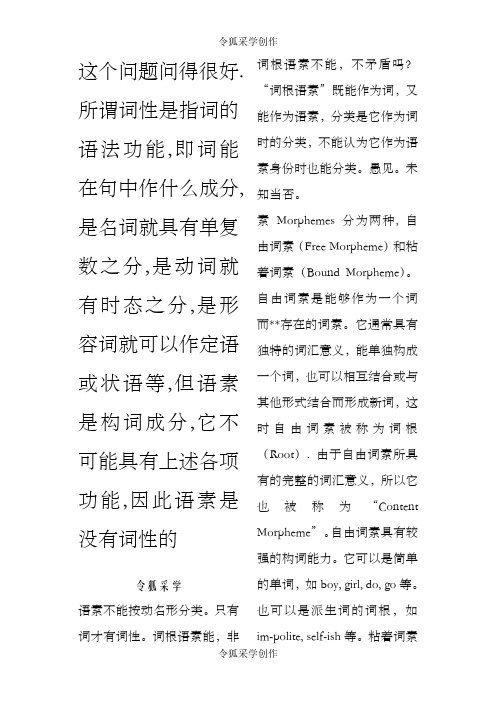
这个问题问得很好.所谓词性是指词的语法功能,即词能在句中作什么成分,是名词就具有单复数之分,是动词就有时态之分,是形容词就可以作定语或状语等,但语素是构词成分,它不可能具有上述各项功能,因此语素是没有词性的令狐采学语素不能按动名形分类。
只有词才有词性。
词根语素能,非词根语素不能,不矛盾吗?“词根语素”既能作为词,又能作为语素,分类是它作为词时的分类,不能认为它作为语素身份时也能分类。
愚见。
未知当否。
素Morphemes 分为两种, 自由词素(Free Morpheme)和粘着词素(Bound Morpheme)。
自由词素是能够作为一个词而**存在的词素。
它通常具有独特的词汇意义,能单独构成一个词,也可以相互结合或与其他形式结合而形成新词,这时自由词素被称为词根(Root). 由于自由词素所具有的完整的词汇意义,所以它也被称为“Content Morpheme”。
自由词素具有较强的构词能力。
它可以是简单的单词,如boy, girl, do, go等。
也可以是派生词的词根,如im-polite, self-ish等。
粘着词素没有完整意义,不能**使用,只有粘附在其他词素(主要是自由词素)上表示一种附加意义或语法意义,所以它又被称为“Grammatical Morpheme”。
黏着词素,顾名思义,是必须黏附在其它词素上构成单词,它们不能作为单词独立使用,如,helpful中的-ful就是一个黏着词素。
黏着词素分为词根和词缀两类。
词根是单词的一部分,经管它们有着明确的语义,但是它们不能单独使用,必须和其它词素或词根结合使用构成单词。
例如;在单词antecedENT 中,ante- 是前缀,表示before, -ced-是词根,意思是go, -ent是后缀,表示a thing or a person。
词素前缀一、否定前缀1.纯否定not①a-②dis-③in-④non-⑤un-2.倒转,去除to reverse, toremove①de-②dis-③un-3.反对,抗,相对against,opposite to①anti-②contra-③counter-④ob-二、空间方位前缀1.前←→后❖前①ante- (before)②fore-(before)③pre-(before)④pro-(forward)❖后①post-(after)②re-(backward)③retro-(backward)2.上←→下❖上①over-(above, on;excessive, too much)②super-(above, beyond)③sur-(over, above)④hyper-(excessive, toomuch)⑤epi-(above)❖下①sub-(undre)②de-(down)③under-(below; lessthan)④hypo-(under, beneath)⑤infra-(below)3.内←→外❖内①in-(in, enter)②im-(in, inward, enter)③intro-(in, inward)④intra-(inside)⑤en-(in)em- (b, m, p前)❖外①e-(out)②ex-(out)③extra-(outside of,beyond)④ultra-(beyond)⑤out-(surpassing, out)4.中间←→周围❖中间①inter-(between)②mid-(in the middle of)❖周围①circum-(round,around)三、对比前缀1.大←→小❖大①macro- (large)②mega-(large)③magn-(big, great)❖小①micro-(very small)②mini-(small)2.多←→少❖多①multi- (many)②poly-(many)❖少①under-(less than, notenough)3.好←→坏❖好①bene- (good, well)②eu-(good, well)❖坏①mal-(bad)male-②mis-(bad)4.新←→旧❖新①neo- (new)❖旧①old-(very small)②pale-(very old, ofancient time)paleo-5.朝向←→离开❖朝向①ad- (to, toward)❖离开①ab-(away, off)②di-(away)6.相同←→不同❖相同①homo- (same)❖不同①hetero-(different)7.聚合←→分散❖聚合①co- (together)②syn-(together, same)sym-❖分散①dis-(apart)②se-(apart)8.正确←→错误❖正确①ortho- (right,straight)❖错误①mis-(wrong)9.喜爱←→憎恶❖喜爱①phil- (liking, fondof)❖憎恶①mis-(hate)10.全←→半❖全①holo- (complete)②omni-(all oreverywhere)③pan-(all)❖半①half-②semi-(half, partially)③hemi-(half)④demi-(half)四、数字前缀1.一①mono- (one, single)②uni-(one, single)二①bi- (two, twice)②twi-(two)③di- (two, double)du-④ambi-(both)⑤amphi- (both)2.三①tri- (three)3.四①quadri- (four)②quarter-(one fourth)4.五①penta- (five)②quinque-(five)5.六①sex- (six)②hexa-(six)6.七①hepta- (seven)7.八①octa- (eight)8.九①nona- (nine)9.十①deca- (ten)heci-10.百①hecto- (hundred)②centi-(hundred)11.千①kilo- (thousand)②milli-(thousand)12.万①myria-13.百万,兆,大量①mega- (six)五、其他前缀1.横过(到对面),穿过①dia- (through,across)②trans-(through,across)③per-(through, across)2.自己,自动①auto-(self)3.心灵,精神,心理①psycho- (mind)4.假的,伪的①pseudo- (false)5.继(无血缘关系)①step- (not by blood)6.改变①trans- (change)7.远①tele- (far, distant)六、改变词性前缀1.a-①将动词变成谓语性形容词alike②将名词变成副词ahead③将名词变成动词amass2.be-①在名词或形容词前,构成及物动词befriend②构成一些介词before3.en- (b, p, m 前为em-)①构成动词enable七、多义前缀1.a-①改变词性②否定not③状态④place where2.ad-①to toward②again, to add3.be-①改变词性②构成介词4.de-①to remove, to reverse②down5.di- (du-)①two, double②away6.dis-①not②to reverse, to remove③apart7.en- (em- b, p, m前)①in②构成动词8.ad-①out②former9.in- (im- b, p, m前)①not②inside, to enter10.mis-①bad②wrong③to hate11.over-①above, on②excessive, too much12.re-①to undo, to reverse②backward③again13.trans-①across②through③to change14.un-①not②to reverse15.under-①beneath, below②less, not enough后缀一、名词后缀1.表示“人”1)inhabitants or dwellers①-an②-er③-ese2)belonging to a certainoccupation①-ian (c, y结尾的形容词或名词后)②-er3) a supporter or believer ofa doctrine①-an②-arian③-ist4)one who does orperforms an act①-ar②-ary③-ate④-ator⑤-ist⑥-ee⑦-eer⑧-or5)to denote a specificfeeling①-ster(a bad sense 贬义)②-y(dearness 亲昵)6)To form a feminine noun①-ess2.抽象1)state or quality①-ance, -ancy附在-ant结尾的形容词后附在动词词根后②-ence, -ency附在-ent结尾的形容词后③-cy附在-te, -tic结尾的词干后④-ability附在-able结尾的形容词后⑤-ibility附在-ible结尾的形容词后⑥-ness附在形容词后2)the action & the result ofthe action①-al (the act of)②-ion, -sion, -tion③-ment (the result ofan action)④-ure (action orresult)3)indicate abstract concepts①-ship (state orcondition of)②-th③-tude4)power, rule, government①-cracy5)action, state or condition,doctrines, example of ause①-ism6)state, condition①-hood②-age7)relationship, status,identity①-ship3.学科①-ic, -ics②-logy4.物质(物品和工具)①-al②-er③-ery5.细小①-cle②-en③-ette④-ling⑤-let二、形容词后缀1.可……的,能……的,易于……的1)-able2)-ible3)-ile2.如……的,似……的,……形状的1)-esque2)-ish3)-like4)-y5)-ly3.有……的,多……的1)-ed2)-ful3)-ous4)-y4.属于……的,与……有关的1)-al2)-an3)-ar4)-ial5)-ic6)-tic7)-ual5.具有……性质的1)-acious2)-aneous3)-ant4)-ar5)-ary6)-ate7)-ative8)-atory9)-ed10)-fic11)-ful12)-ical13)-id14)-ious15)-ite16)-itive17)-ive18)-ly19)-ory20)-ous21)-some6.某国的,某地的1)-an2)-ese3)-ian4)-ish7.其它1)-ing①使……的exciting②正……在的developing2)-ed①已……的retired②受……的educated3)-ish 略……的,稍……的greenish coldish4)-less 无……的useless5)-proof 防……的,不令狐采学创作透……的waterproofairproof三、动词后缀1.to make; to cause tobecome①-ate②-en③-fy④-ish⑤-ize⑥-ise (BrE)2.repeated or continuousaction①-er3.onomatopoeic action①-sh四、副词后缀1.方式,方法,状态,……地①-ably②–ibly③–ly (一般加在形容词后)2.表示方向①-ward②-wise五、多义后缀1.-al①与……有关,有……的特点autumnal②……的行为refusal③物品manual2.-an①……国(人)European②支持(信仰)……的Christian③职业librarian3.-ar①加在名词后,构成形容词令狐采学创作singular②加在动词后,构成名词liar4.-ate①表现出……的,充满……的considerate②使……,使成为……regulate③机构或部门consulate5.-er①加在动词后,构成名词fertilizer②职业,工作banker③……地方或国家的人northerner④构成形容词或副词比较级smaller harder6.-ish①像……一样的,有……特点的snobbish②……国的,……语的British English③沉迷于……的,倾向于……的bookish④稍许,有点儿sweetish⑤动词后缀nourish7.-ism①加在动词后,构成名词criticism②动作,事业tourism③状态,状况alcoholism④学说,主义,信条令狐采学创作socialism⑤语言上的用法和特点witticism8.-ly①加在形容词后,构成副词gradually②加在表示时间的名词前,构成形容词或副词;每……的weekly③像……一样的,具有……性质的worldly9.-ment①行为movement②行为的结果、状态refreshment③行为后的具体产物pavement10.-ship①状态,身份membership②技巧,能力leadership③关系kinship11.-y①有……的,表现出……的,像……一样的silvery②亲昵mummy③加在动词后,构成名词。
语言学morpheme资料

3.1 What is Morpheme? 什么是语素?
• 3.1.1 Morpheme and Morphology 语素和形态学
• 3.1.2 Types of Morphemes 语素的类型
• 3.1.3 Morphological change and Allomorph
mono-morphemic words(单语素词). All mono-morphemic words are free morphemes.
Compounds(复合词):there are poly morphemic words(多语素词),which consist wholly of free morphemes.
distempered
dis temper -ed
bound morphemes
free morphemes
2.Root, affix and stem 词根,词缀,词干
A. Root(词根): the base form of a word that cannot be further analyzed without destroying its meaning,that is to say,it is that part of the word that is left when all the affixes are removed. (词根是构成词的基础成分,不能再作进一步分析而不破坏其意义。 也就是说,把一个词的所有词缀去掉之后的部分就是词根。)
Normally divided into: – prefix (dis-, un-)前缀 dislike undo – suffix (-ize, -tion)后缀 colonize revolution – Infix (-ee-) 中缀 feet
词素分类

这个问题问得很好.所谓词性是指词的语法功能,即词能在句中作什么成分,是名词就具有单复数之分,是动词就有时态之分,是形容词就可以作定语或状语等,但语素是构词成分,它不可能具有上述各项功能,因此语素是没有词性的语素不能按动名形分类。
只有词才有词性。
词根语素能,非词根语素不能,不矛盾吗?“词根语素”既能作为词,又能作为语素,分类是它作为词时的分类,不能认为它作为语素身份时也能分类。
愚见。
未知当否。
素Morphemes 分为两种, 自由词素(Free Morpheme )和粘着词素(Bound Morpheme )。
自由词素是能够作为一个词而**存在的词素。
它通常具有独特的词汇意义,能单独构成一个词,也可以相互结合或与其他形式结合而形成新词,这时自由词素被称为词根(Root ). 由于自由词素所具有的完整的词汇意义,所以它也被称为“Content Morpheme”。
自由词素具有较强的构词能力。
它可以是简单的单词,如boy, girl, do, go 等。
也可以是派生词的词根,如 im-polite, self-ish 等。
粘着词素没有完整意义,不能**使用,只有粘附在其他词素(主要是自由词素)上表示一种附加意义或语法意义,所以它又被称为“Grammatical Morpheme”。
黏着词素,顾名思义,是必须黏附在其它词素上构成单词,它们不能作为单词独立使用,如,helpful 中的-ful就是一个黏着词素。
黏着词素分为词根和词缀两类。
词根是单词的一部分,经管它们有着明确的语义,但是它们不能单独使用,必须和其它词素或词根结合使用构成单词。
例如; 在单词 anteced ENT 中,ante- 是前缀,表示 before,-ced-是词根,意思是go, -ent 是后缀,表示a thing or a person 。
词 素前 缀一、 否定前缀1.纯否定 not ① a- ② dis- ③ in- ④ non- ⑤ un-2.倒转,去除 to reverse, to remove ① de- ② dis- ③ un- 3.反对,抗,相对 against, opposite to ① anti- ② contra- ③ counter- ④ ob-二、 空间方位前缀1.前 ←→ 后 ❖前① ante- (before) ② fore- (before) ③ pre- (before) ④ pro- (forward) ❖后① post- (after) ② re- (backward) ③ retro- (backward)2.上 ←→ 下 ❖上 ① over- (above, on; excessive, toomuch)② super- (above, beyond) ③ sur- (over, above)④hyper-(excessive, too much)⑤epi- (above)❖下①sub-(undre)②de-(down)③under- (below; less than)④hypo-(under, beneath)⑤infra- (below)3.内←→外❖内①in-(in, enter)②im-(in, inward, enter)③intro- (in, inward)④intra-(inside)⑤en- (in)em- (b, m, p前)❖外①e-(out)②ex-(out)③extra- (outside of, beyond)④ultra-(beyond)⑤out- (surpassing, out)4.中间←→周围❖中间①inter-(between)②mid-(in the middle of)❖周围①circum-(round, around)三、对比前缀1.大←→小❖大①macro- (large)②mega-(large)③magn- (big, great)❖小①micro- (very small)②mini- (small)2.多←→少❖多①multi- (many)②poly-(many)❖少①under- (less than, not enough)3.好←→坏❖好①bene- (good, well)②eu-(good, well)❖坏①mal- (bad)male-②mis- (bad)4.新←→旧❖新①neo- (new)❖旧①old- (very small)②pale- (very old, of ancient time)paleo-5.朝向←→离开❖朝向①ad- (to, toward)❖离开①ab- (away, off)②di- (away)6.相同←→不同❖相同①homo- (same)❖不同①hetero- (different)7.聚合←→分散❖聚合①co- (together)②syn-(together, same)sym-❖分散①dis- (apart)②se- (apart)8.正确←→错误❖正确①ortho- (right, straight)❖错误①mis- (wrong)9.喜爱←→憎恶❖喜爱①phil- (liking, fond of)❖憎恶①mis- (hate)10.全←→半❖全①holo- (complete)②omni-(all or everywhere)③pan- (all)❖半①half-②semi- (half, partially)③hemi- (half)④demi- (half)四、数字前缀1.一①mono- (one, single)②uni-(one, single)二①bi- (two, twice)②twi-(two)③di- (two, double)du-④ambi-(both)⑤amphi- (both)2.三①tri- (three)3.四①quadri- (four)②quarter-(one fourth)4.五①penta- (five)②quinque-(five)5.六①sex- (six)②hexa-(six)6.七①hepta- (seven)7.八①octa- (eight)8.九①nona- (nine)9.十①deca- (ten)heci-10.百①hecto- (hundred)②centi-(hundred)11.千①kilo- (thousand)②milli-(thousand)12.万①myria-13.百万,兆,大量①mega- (six)五、其他前缀1.横过(到对面),穿过①dia- (through, across)②trans-(through, across)③per- (through, across)2.自己,自动①auto-(self)3.心灵,精神,心理①psycho- (mind)4.假的,伪的①pseudo- (false)5.继(无血缘关系)①step- (not by blood)6.改变①trans- (change)7.远①tele- (far, distant)六、改变词性前缀1.a-①将动词变成谓语性形容词alike②将名词变成副词ahead③将名词变成动词amass2.be-①在名词或形容词前,构成及物动词befriend②构成一些介词before3.en- (b, p, m 前为em-)①构成动词enable七、多义前缀1.a-①改变词性②否定not③状态④place where2.ad-①to toward②again, to add3.be-①改变词性②构成介词4.de-①to remove, to reverse②down5.di- (du-)①two, double②away6.dis-①not②to reverse, to remove③apart7.en- (em- b, p, m前)①in②构成动词8.ad-①out②former9.in- (im- b, p, m前)①not②inside, to enter10.mis-①bad②wrong③to hate11.over-①above, on②excessive, too much12.re-①to undo, to reverse②backward③again13.trans-①across②through③to change14.un-①not②to reverse15.under-①beneath, below②less, not enough后缀一、名词后缀1.表示“人”1)inhabitants or dwellers①-an②-er③-ese2)belonging to a certain occupation①-ian (c, y结尾的形容词或名词后)②-er3) a supporter or believer of a doctrine①-an②-arian③-ist4)one who does or performs an act①-ar②-ary③-ate④-ator⑤-ist⑥-ee⑦-eer⑧-or5)to denote a specific feeling①-ster(a bad sense 贬义)②-y(dearness 亲昵)6)To form a feminine noun①-ess 2.抽象1)state or quality①-ance, -ancy附在-ant结尾的形容词后附在动词词根后②-ence, -ency附在-ent结尾的形容词后③-cy附在-te, -tic结尾的词干后④-ability附在-able结尾的形容词后⑤-ibility附在-ible结尾的形容词后⑥-ness附在形容词后2)the action & the result of the action①-al (the act of)②-ion, -sion, -tion③-ment (the result of an action)④-ure (action or result)3)indicate abstract concepts①-ship (state or condition of)②-th③-tude4)power, rule, government①-cracy5)action, state or condition, doctrines,example of a use①-ism6)state, condition①-hood②-age7)relationship, status, identity①-ship3.学科①-ic, -ics②-logy4.物质(物品和工具)①-al②-er③-ery5.细小①-cle②-en③-ette④-ling⑤-let二、形容词后缀1.可……的,能……的,易于……的1)-able2)-ible3)-ile2.如……的,似……的,……形状的1)-esque2)-ish3)-like4)-y5)-ly3.有……的,多……的1)-ed2)-ful3)-ous4)-y4.属于……的,与……有关的1)-al2)-an3)-ar4)-ial5)-ic6)-tic7)-ual5.具有……性质的1)-acious2)-aneous3)-ant4)-ar5)-ary6)-ate7)-ative8)-atory9)-ed10)-fic11)-ful12)-ical13)-id14)-ious15)-ite16)-itive17)-ive18)-ly19)-ory20)-ous21)-some6.某国的,某地的1)-an2)-ese3)-ian4)-ish7.其它1)-ing①使……的excit ing②正……在的develop ing2)-ed①已……的retir ed②受……的educat ed3)-ish 略……的,稍……的green ish cold ish4)-less 无……的use less5)-proof 防……的,不透……的water proof air proof三、动词后缀1.to make; to cause to become①-ate②-en③-fy④-ish⑤-ize⑥-ise (BrE)2.repeated or continuous action①-er3.onomatopoeic action①-sh四、副词后缀1.方式,方法,状态,……地①-ably②–ibly③–ly (一般加在形容词后)2.表示方向①-ward②-wise五、多义后缀1.-al①与……有关,有……的特点autumn al②……的行为refus al③物品manu al2.-an①……国(人)Europe an②支持(信仰)……的Christi an③职业librari an3.-ar①加在名词后,构成形容词singul ar②加在动词后,构成名词li ar4.-ate①表现出……的,充满……的consider ate②使……,使成为……regul ate③机构或部门consul ate5.-er①加在动词后,构成名词fertiliz er②职业,工作bank er③……地方或国家的人northern er④构成形容词或副词比较级small er hard er6.-ish①像……一样的,有……特点的snobb ish②……国的,……语的Brit ish Engl ish③沉迷于……的,倾向于……的book ish④稍许,有点儿sweet ish⑤动词后缀nour ish7.-ism①加在动词后,构成名词critic ism②动作,事业tour ism③状态,状况alcohol ism④学说,主义,信条social ism⑤语言上的用法和特点wittic ism8.-ly①加在形容词后,构成副词gradual ly②加在表示时间的名词前,构成形容词或副词;每……的week ly③像……一样的,具有……性质的world ly9.-ment①行为move ment②行为的结果、状态refresh ment③行为后的具体产物pave ment10.-ship①状态,身份member ship②技巧,能力leader ship③关系kin ship11.-y①有……的,表现出……的,像……一样的silver y②亲昵mumm y③加在动词后,构成名词。
戴炜栋语言学-Chapter 3 Morphology

戴炜栋语言学-Chapter 3 Morphology●开放类和封闭类Open class and closed class●开放性词类(open class words):名词、动词、副词和形容词●封闭性词类(closed words):连词、介词、冠词、代词●词素Morphemes---the minimal units of the meaning●词素的定义the definition●词素morpheme--带着信息和功能的语言的最小单位 a morpheme can be definedas.a minimal unit of meaning.例如:reader是由read和er两个词素组成 boys是由boy和-s两个词素●注意:●词素既不是意义,也不是音阶,而是意义和音阶的组合;●词素通常是任意的,他们的声音和意义之间没有必然的联系;●如果想区分词素之间的区别,可以使用语素(morph);●区分独立词和复杂词的区别:前者为单一词素构成,后者包括两个及以上的词素●词素的分类●自由和黏着词素(Free and bound morphemes)●自由词素:可以独立成词的词素成为自由词素 can be a word by itself●黏着词素:必须依附于另一个词素must be attracted to another one●同质异形体(Allomorphs)The variant forms of a morpheme are called its allomorphs.●Analyzing word structures分析词的结构●root词根 The roots constitutes the core of the word and carries the major component ofits meaning.●The roots typically belongs to a lexical category and are always bound morphemes.●affixes词缀 Affixes do not belong to a lexical category and are always bound morphemes ●Derivational and inflectional morphemes派生词素和曲折词素●派生词素:-en, -ate, and -ic are thus called derivational morphemes●曲折词素:there are bound morphemes which are for the most part of purelygrammatical markers and signify such concepts as tense, number, case and so on.●Morphological rules of word formation构词的形态学规则●词的构成方式被称为形态学规则(morphological rules),这些规则决定了词素怎样组合成为词。
英语词汇学第三章复习资料

第三章词汇:morpheme 词素morph 形素monomorphenic wordsallomorph词素变体discrete adj. 离散的,不连续的identical adj. 同一的;完全相同的derived words 派生词Affixes 词缀要点:一. Morpheme —A morpheme is the smallest meaningful unit of a language.(The smallest functional unit in the composition of words.)二.1.Morph-A morpheme must be realized by discrete(分散的)units. These actual spoken minimal carriers of meaning are morphs.2.Monomorphenic words –morphemes are realized by single morphs.3.Allomorph—Some morphemes are realized by more than one morph according to their position. Such alternative morphs are allomorphemes.E.g. the morpheme of plurality (-s)has a number if allomorphemes in different sound context1).-s,/s/ 在/t,p,k/后;/z/在/d,b,g/后;/iz/在/s,z,shi,gi,chi/change an internal vowel,foot-feetzero morph,deer-deer2).-ed,/t/在/p,k/后;/d/在/m,n,ng,l/;/id/在/t,d/in-,im-,ir-,il- ,/im/ first sound /p,b,m/ ;/ir/ ,/r/;/il/,/l/;其余都用in三.1. Free morphemes or Free root —The morphemes have complete meaning andcan be used as free grammatical units in sentencese.g.cat,walk.(They are identical with root words. morphemes which are independent of other morphe mes are considered to be free.)2. Bound Morphemes —The morphemes cannot occur as separate words. They are bound to other morphemes to form wordse.g. recollection (re+collect+ion)collect – free morpheme re-and–ion are bound morphemes. (include bound root and affix)Bound morphemes are found in derived words1). Bound root —A bound root is that part of the word that carries the fundamental meaning just like a fr ee root. Unlike a freeroot,it is a bound form and has to combine with other morphemes to make words.e.g.-dict-it conveys the meaning of ―say or speak as a Latin rootbut not as a word. With the prefix pre-(=beforewe obtain the verb predict meaning ―tell beforehandContradict ― speak againstBound roots are either Latin or Greek.limited in number,their productive power is amazing2). Affixes —forms that are attached to words or word elements to modify meaning or function. Almost affixes are bound morphemes.a. Inflectional morphemes or Inflectional affixes —Affixes attaches to the end of words to indicate grammaticalrelationships are inflectional,thus known as inflectional morphemes. The number of infl ectional affixes is small and stable.(a. There is the regular plural suffix -s(-es)which is added to nouns such as machines,desks.b. Simple present for the third person singular. –s(-es)c. The possessive case of nouns. ’sd. –er and –est to show comparative and superlative degreee. The past tense marker –edf. –ing to form present participles or gerunds.)b. Derivational morphemes or Derivational affixes —Derivational affixes are affixes added to other morphemes to create new words.a). Prefixes —are affixes that come before the word,such as,pre+war,sub+seab). Suffixes —are affixes that come after the word,for instance,blood+y四.1. Root-- is the basic form of a word,which cannot be further analyzed without total loss of identity. (What remains of a word after the removal of all affixes.)e.g. ―internationalists removing inter-,-al-,-ist,-s,leaves the root nation.2. Stem —a form to which affixes of any kind can be added.E.g. ―internationalists-nation is a root and a stem as well.a stem may consist of a single root or two roots and a root plus a affix. a stem can be a root or a form bigger than a root。
